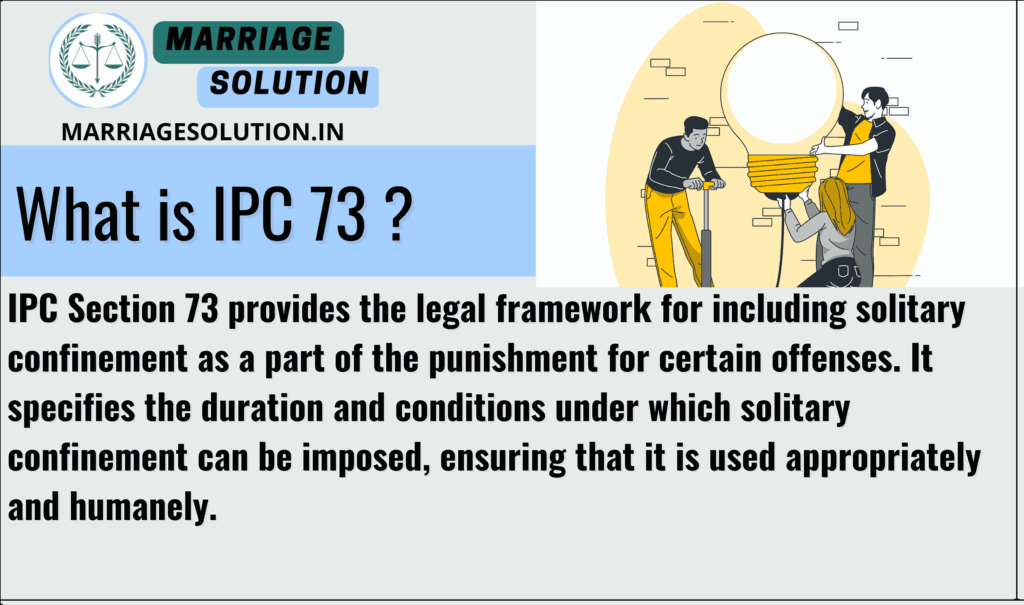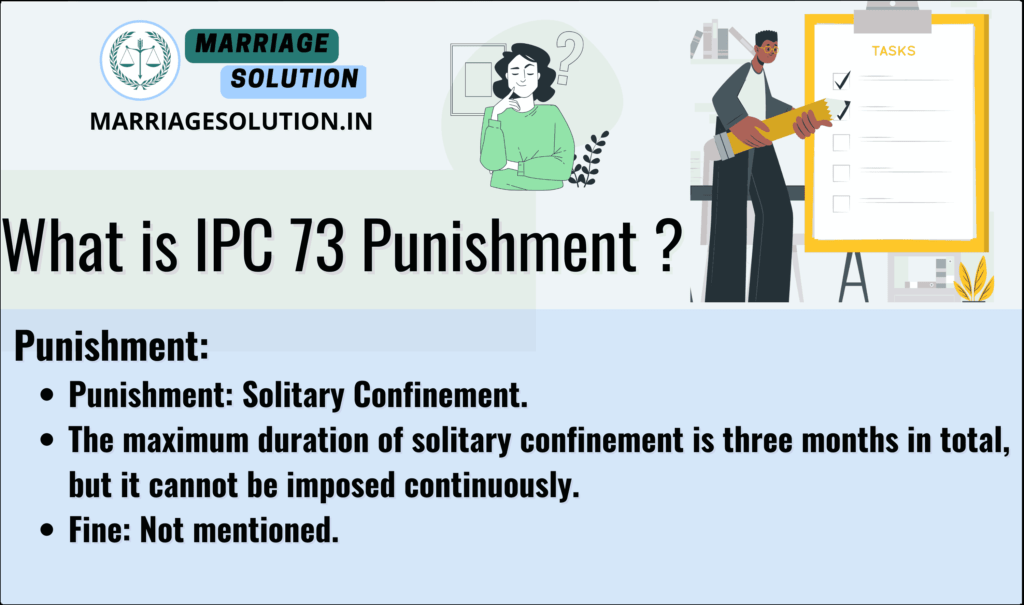Introduction of IPC 73
The Indian Penal Code (IPC) serves as the foundational legal document for criminal law in India, defining various offenses and their corresponding punishments. IPC Section 73 deals with the imposition of solitary confinement as a part of the punishment. This section outlines the conditions under which solitary confinement can be applied.
What is IPC Section 73 ?
IPC Section 73 provides the legal framework for including solitary confinement as a part of the punishment for certain offenses. It specifies the duration and conditions under which solitary confinement can be imposed, ensuring that it is used appropriately and humanely.

IPC Section 73 Overview
IPC Section 73 provides the legal framework for including solitary confinement as part of the punishment for certain offenses. It specifies the rules and conditions under which solitary confinement can be imposed, ensuring it is used appropriately and humanely.
Some key points about this section:
- Solitary Confinement Objective
- The main purpose of solitary confinement is to increase the severity of punishment for certain crimes.
- It aims to act as a deterrent and reinforce discipline among prisoners.
- Duration Restrictions
- There are specific limits on how long solitary confinement can last.
- It cannot exceed 3 months in total, with a maximum of 14 days at a time, and gaps of at least 14 days in between.
- Applicable Offenses
- Solitary confinement is applicable for offenses where the law prescribes rigorous imprisonment.
- It is an additional punishment used at the court’s discretion.
- Human Rights Safeguards
- The section has safeguards to prevent abuse and ensure solitary confinement is used humanely.
- It aims to balance discipline with respect for prisoners’ human rights.
- Judicial Authority
- The court has the discretion to decide whether to impose solitary confinement as part of the punishment.
- This ensures each case is evaluated individually based on circumstances.
- Rehabilitation Emphasis
- While severe, the section implicitly encourages using rehabilitative and corrective measures alongside punishment.
IPC 73 Punishment
Punishment: Solitary Confinement.
The maximum duration of solitary confinement is three months in total, but it cannot be imposed continuously.
Fine: Not mentioned.

73 IPC bailable or not ?
The bailability of offenses under IPC Section 73 depends on the nature of the principal offense. Since solitary confinement is an additional form of punishment, the bail conditions are determined by the primary offense.
Section 73 IPC in short information
| Offense | Definition | Punishment | Bailable or Not |
|---|---|---|---|
| Offenses warranting rigorous imprisonment with additional solitary confinement | Legal provision for solitary confinement as part of the punishment | Solitary confinement not exceeding three months in total, with specific duration limits | Depends on the nature of the principal offense |
IPC 73 FAQs
Section 73 IPC in short information
IPC Section 73 covers the imposition of solitary confinement as part of the punishment for certain offenses requiring rigorous imprisonment.
What are the duration limits for solitary confinement under IPC Section 73?
Solitary confinement can be imposed for up to three months in total, with each period not exceeding 14 days and intervals of not less than 14 days between periods.
Which offenses can solitary confinement be applied to under IPC Section 73?
It applies to offenses where rigorous imprisonment is prescribed as a punishment.
Is IPC Section 73 concerned with human rights?
Yes, the section includes safeguards to ensure that solitary confinement is used humanely and does not violate human rights.
If you need support with court proceedings or any other legal matters, don’t hesitate to reach out for assistance.
Court or any other marriage-related issues, our https://marriagesolution.in/lawyer-help-1/ website may prove helpful. By completing our enquiry form and submitting it online, we can provide customized guidance to navigate through the process effectively. Don’t hesitate to contact us for personalized solutions; we are here to assist you whenever necessary!
